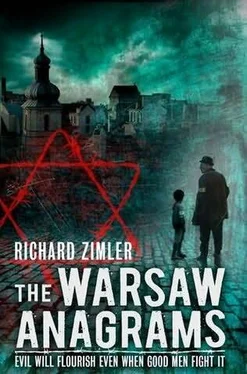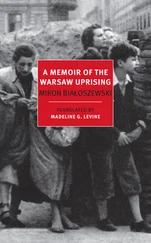I propped Stefa up with pillows and spooned soup into her mouth, but she ate with inner-turned eyes and said nothing to me.
Then – God knows why – I sat at my desk and wrote a list of all the people I had known who were dead, starting with Adam and Hannah. I counted them when I was done: twenty-five. I spent another hour working on the list and came up with two more. But I still wasn’t satisfied.
Only then did I remember that my mother became a frenzied list-maker after my younger brother was born. Papa and I would find her numbered inventories everywhere around the house. Years later, I asked her about it, and she told me it was the only way she could keep her head above the high water of having two children to raise.
On a whim, I inserted Erik Honec after my mother’s name, and it was a relief to see my alter ego there; it meant I would escape the ghetto one way or another.
I settled into Stefa’s armchair for the night. She stirred only once, some time after midnight, needing to pee, and her fever was down a little in the morning. She thanked me in a strong voice when I handed her a cup of hot tea sweetened with molasses and the sugar crystal I’d saved. I felt she’d returned home and kissed her cheek in welcome. After smearing rhubarb jam on her toast, I fed her pieces on the end of a fork. She joked about my aristocratic table manners, which seemed a very good sign, but while I was in the kitchen making myself some ersatz coffee, she called out, ‘Is Adam’s shirt dry yet?’
I went in to her. Maybe something in my expression reminded her of the truth; her eyes opened wide in horror and she brought her hands to her mouth.
‘He’s dead, isn’t he?’ she whispered timidly.
‘Let’s talk,’ I said, rubbing her feet through the covers. ‘You’ll tell me whatever you want, and I’ll make no judgements. I promise.’
I made that vow because I couldn’t bear the thought of being remembered as an unfair uncle after I was gone.
‘No,’ she told me firmly. ‘There’s nothing to talk about.’
I stood up and retreated to the kitchen. There was a knock on the door while I was staring mindlessly into my coffee. I found Wolfi, Feivel and Sarah looking up at me from the landing. Their little faces were fearful; I suppose they thought that Adam’s death might have turned me against them.
‘Hello, Dr Cohen, we… we came to see Gloria,’ Feivel told me hesitantly.
‘She’s not doing so good,’ I replied. ‘But you can come in and feed her if you like.’
While Feivel and Wolfi spilled seeds into her dish, Sarah carried the budgie’s water cup back from the sink in both her hands, determined not to spill a drop. Her clenched determination gave me an idea.
‘Maybe one of you could adopt Gloria,’ I suggested. ‘Adam would want that.’
Wolfi said, ‘My dad hates pets. And he says birds shit all the time.’
Feivel gazed down, swirling his foot. Sarah bit her lip, looking as if she wanted to dash away.
‘Forget what I said,’ I told them. ‘I was being thoughtless.’
‘No, I’ll take her!’ Feivel announced, and he nodded hard when I looked at him, as if to convince us both.
As the two boys carried the cage downstairs, Sarah looked back at me for a moment, as though to fix me and the apartment in her memory, and I realized – with despair clutching at me – that I’d never see her or any of Adam’s other friends ever again.
At 9.15, I left Stefa alone to visit Mrs Rackemann. She let me into her shop and locked the door with a firm twist of her hand.
The forger she’d hired – who went by the name of Otto – had typed me a document on Nazi stationery identifying Erik Honec as Sub-Director for the Warsaw District of the Reichsministerium des Innern , the Ministry of the Interior. I’d suggested the Reich Census Office, but Mrs Rackemann informed me that Otto had advised something more general, in case I ever embarked on another escapade demanding a slightly different government posting.
She grinned cagily on telling me that – she plainly adored trying to outwit the Nazis.
I tilted the stationery towards the light from her desk lamp. At the top of the sheet of off-white paper, the Nazi emblem – an eagle perched on a wreath centred by a swastika – looked sinisterly impressive. And the embossed stamp at the bottom seemed to be the real thing. As I ran my finger over its surface, Mrs Rackemann said, ‘Otto’s pretty damn good, isn’t he?’
‘A real pro,’ I agreed.
‘He produced papers for the Polish Interior Ministry for several years. He knows what he’s doing – though he wished you’d supplied him with a photograph.’
‘I might have lost my nerve if I’d gone home to get one. Besides, a Pole won’t know what to expect, and I’m not planning on identifying myself to any German officials.’
After I promised her the rest of her payment the next day, Mrs Rackemann handed me a pen for the last detail. I signed my new name with the decisive flourishes I’d practised – a vow of revenge turned to ink.
Having had hundreds of Christian acquaintances before being forced into the ghetto, I’d decided that a change of appearance was in order before I ventured into the Other Side; after all, if someone recognized me and denounced me, I’d be executed on the spot. So before going home, I bought hair dye at a beauty parlour on Nalewki Street.
The homemade concoction turned into a frothy, milky-brown cream when I mixed it with water, and it tickled my scalp. I had my doubts about its effectiveness, but when I washed it off, my hair was black and shiny. The contrast with my ghostly skin and deep wrinkles made me look like an aged flamenco dancer clinging desperately to youth. My eyes seemed smaller, too, as if the I inside me were trapped in a deep cave.
Taking off my clothes and sitting close to my heater, I sponged off weeks of grime as best I could with our mushy ghetto soap. Then I shaved carefully, and dabbed my chin and cheeks with Stefa’s rosewater perfume.
I dressed in my chestnut-brown woollen suit, which I hadn’t worn since the day I’d moved into Stefa’s apartment, but the heavy fabric sagged clownishly off my shrunken shoulders, so I put on a jumper underneath. I didn’t wear my overcoat because it looked like a rag. Better to freeze than risk ruining my disguise.
As a last touch, I went to see Izzy to borrow his Borsalino. He’d recently moved his old army cot into his workshop because three newly arrived cousins of his were living in his apartment and he was feeling cornered.
On opening his door to me, he grimaced. ‘ Gottenyu , Erik!What the hell happened to you?’
‘I needed a new identity,’ I explained, stepping inside.
‘And it involves putting a dead crow on your head?’
‘I’m a zookeeper in a Yiddish farce,’ I quipped.
‘They keep typecasting you!’ he observed gleefully; even in grief – especially then – Izzy thrived on repartee.
‘Tell me the truth – could I pass for the me I used to be?’
He sized me up, having to choose between humour and honesty. ‘That depends on which you you intend to impersonate,’ he replied. ‘But why would you want to?’
‘Never mind that. I’ll need your Borsalino. Where is it?’
‘So you’re trying for the romantic lead, after all?’ A lecherous spark went off in his eyes.
‘Listen, if I don’t come back, take any clothing of mine you want. And take my books.’
‘If you’re up to something dangerous, I want to know what it is.’
‘It’s a long story.’
‘Tell me the condensed version or you can forget my help.’
After I told him about Anna, and showed him my Interior Ministry papers, he made clicking noises with his tongue – Izzy’s code for a risky adventure – then slipped into the stationery warehouse behind his workshop to fetch his Borsalino. I needed to pee and went to the lavatory, which was a tin bucket hidden behind a folding screen. Hanging from the ceiling were paper arrows pointing towards Moscow, New York, Rio de Janeiro and the North Pole. A bigger one, facing southwest, read: Boulogne-Billancourt: 1,300 kilometres ; Izzy’s two adult sons – Ryszard and Karl – both worked as aircraft mechanics in that industrial suburb of Paris.
Читать дальше












